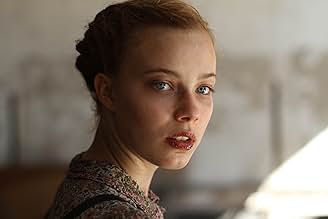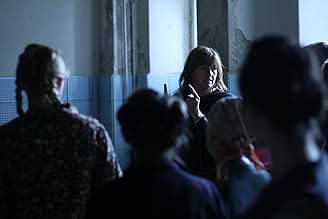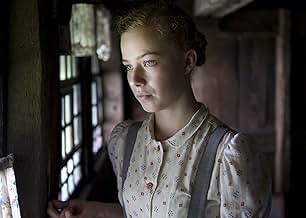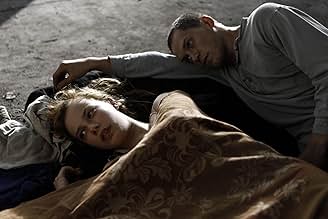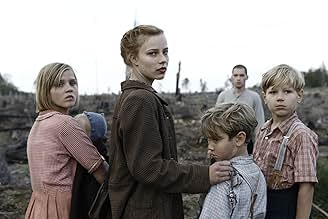As the Allies sweep across Germany, Lore leads her siblings on a journey that exposes them to the truth of their parents' beliefs. An encounter with a mysterious refugee forces Lore to rely ... Read allAs the Allies sweep across Germany, Lore leads her siblings on a journey that exposes them to the truth of their parents' beliefs. An encounter with a mysterious refugee forces Lore to rely on a person she has always been taught to hate.As the Allies sweep across Germany, Lore leads her siblings on a journey that exposes them to the truth of their parents' beliefs. An encounter with a mysterious refugee forces Lore to rely on a person she has always been taught to hate.
- Director
- Writers
- Stars
- Awards
- 34 wins & 34 nominations total
Kai-Peter Malina
- Thomas
- (as Kai Malina)
Nick Holaschke
- Baby Peter
- (as Nick Leander Holaschke)
Claudia Geisler-Bading
- Ox Cart Woman
- (as Claudia Geisler)
Hanne B. Wolharn
- School House Woman 3
- (as Hanne Wolharn)
- Director
- Writers
- All cast & crew
- Production, box office & more at IMDbPro
7.116.4K
1
2
3
4
5
6
7
8
9
10
Featured reviews
Grim, dense, and completely captivating.
Director/writer Cate Shortland has created something truly remarkable, forcing us to find within ourselves sympathy for a young Nazi. The story is grim and dense, but features one hell of a lead performance. Shortland combines wonderful visuals with a brutal story of survival, involving family and patriotism, and a running commentary on the state of Germany after the fall of the Third Reich.
As the German army collapses in the spring of 1945, the breakdown of a family serves as a microcosm of a country in despair in the closing days of World War II. Lore (Saskia Rosendahl) and her four younger siblings are abandoned as their Nazi- supporting parents are forced to flee the Allied forces. As they travel on foot to their grandmother's house in Hamburg, the children encounter a young Jewish refuge, Thomas, on whom they are forced to rely for both food and safe passage through Ally-occupied lands. As she is exposed to the lies of their parents, and begins to develop feelings for one whom she has been taught to hate, Lore is forced to come to terms with a belief system that is quickly unraveling.
It's the children that have to do all the heavy lifting in the film dramatically, and they carry their weight, and then some. The film is anchored by a remarkable lead performance from Rosendahl, who comes across as a seasoned veteran, despite this being her debut performance. Her character goes from obnoxious adolescent to young adult, via a series of confronting moments where her morals and beliefs are challenged. Her vibrant youthful spirit is replaced with a burning rage with a war torn Europe as the backdrop.
A new perspective on an event often forces an audience to confront disturbing realities they may wish to avoid. Although "Lore" relates a story from the second world war, it reveals the point of view of those we do not often consider: children of a high-ranking Nazi official. This story may not be pleasant, but it is certainly fascinating.
As the German army collapses in the spring of 1945, the breakdown of a family serves as a microcosm of a country in despair in the closing days of World War II. Lore (Saskia Rosendahl) and her four younger siblings are abandoned as their Nazi- supporting parents are forced to flee the Allied forces. As they travel on foot to their grandmother's house in Hamburg, the children encounter a young Jewish refuge, Thomas, on whom they are forced to rely for both food and safe passage through Ally-occupied lands. As she is exposed to the lies of their parents, and begins to develop feelings for one whom she has been taught to hate, Lore is forced to come to terms with a belief system that is quickly unraveling.
It's the children that have to do all the heavy lifting in the film dramatically, and they carry their weight, and then some. The film is anchored by a remarkable lead performance from Rosendahl, who comes across as a seasoned veteran, despite this being her debut performance. Her character goes from obnoxious adolescent to young adult, via a series of confronting moments where her morals and beliefs are challenged. Her vibrant youthful spirit is replaced with a burning rage with a war torn Europe as the backdrop.
A new perspective on an event often forces an audience to confront disturbing realities they may wish to avoid. Although "Lore" relates a story from the second world war, it reveals the point of view of those we do not often consider: children of a high-ranking Nazi official. This story may not be pleasant, but it is certainly fascinating.
Intriguing investigation of under-explored era
Set in Germany at the end of the Second World War, this film takes up where others like Downfall leave off and asks questions about how the erstwhile beneficiaries of Nazi rule cope with their new world. The film tracks the journey of five innocents as their life of privilege collapses and they are forced to come to terms with the effects of dreadful events over which they had no control but to which they have given their tacit support.
Four of these children are really too young to bear any culpability. Only the oldest, Lore, is really capable of comprehension and it is through her eyes that the film is focused, as she slowly realises just how much her parents are implicated in the horrors of the Nazi regime, and, as an extension of this, herself and the whole German people. Lore is helped to this realisation by Thomas, a Jew who appears to have been liberated from a concentration camp. But Thomas also has a psychological burden and may not be all he appears.
This is another fine film from Cate Shortland, someone who surely should be making more films more often.
Four of these children are really too young to bear any culpability. Only the oldest, Lore, is really capable of comprehension and it is through her eyes that the film is focused, as she slowly realises just how much her parents are implicated in the horrors of the Nazi regime, and, as an extension of this, herself and the whole German people. Lore is helped to this realisation by Thomas, a Jew who appears to have been liberated from a concentration camp. But Thomas also has a psychological burden and may not be all he appears.
This is another fine film from Cate Shortland, someone who surely should be making more films more often.
Gripping tale of the human urge to survive
You'd think that, 68 years after the end of the second World War, every perspective would have been covered by the numerous films that have been made about it. But 'Lore' proves that it's still possible to make a movie about an unknown aspect of the war.
In this case, it's the situation in Germany just after the victory of the allied forces. It's a very interesting perspective, because things get turned around. The Nazis are no longer powerful rulers, but hapless losers, afraid to get caught by the Americans. And the Jews, although still despised by most Germans, are the ones who get things done with the allied troops.
The movie shows a country in an almost apocalyptic state, with dead people and destructed buildings everywhere. Citizens can't trust each other and are willing to do anything for some food or transportation. The powers are constantly shifting; an ally can suddenly turn into an enemy.
It's in this utterly destructed and disheartened country that a family without parents is finding its way, led by Lore, a girl of approximately 16 or 17 years old. Her parents, high-ranking Nazis's, have left her to hide from the Americans, and it's up to her to lead her younger sister and three little brothers (of which one is still a baby) to her grandmother in the north of the country. They have to beg for food and shelter, sometimes paying with the jewels her mother left behind.
Australian director Cate Shortland is very good in capturing the mood of desperation and defeat. She uses faded colours, almost like a Polaroid picture, and shows lots of close-ups. Not only of faces, but also of hands, feet, clothes and shoes. It accentuates the oppressive atmosphere in post-war Germany, and the terrible fate of the children. The story gets a twist when the children meet a young man, who for some reason is willing to help them. The relationship between Lore and the young man is ambiguous, for several reasons.
'Lore' is not easy to watch. There are several disturbing and gruesome scenes in the film. But it's a gripping tale of the human urge to survive in almost inhuman circumstances. And most of all, it reminds us of the utter horrors of war. This war, and any war.
In this case, it's the situation in Germany just after the victory of the allied forces. It's a very interesting perspective, because things get turned around. The Nazis are no longer powerful rulers, but hapless losers, afraid to get caught by the Americans. And the Jews, although still despised by most Germans, are the ones who get things done with the allied troops.
The movie shows a country in an almost apocalyptic state, with dead people and destructed buildings everywhere. Citizens can't trust each other and are willing to do anything for some food or transportation. The powers are constantly shifting; an ally can suddenly turn into an enemy.
It's in this utterly destructed and disheartened country that a family without parents is finding its way, led by Lore, a girl of approximately 16 or 17 years old. Her parents, high-ranking Nazis's, have left her to hide from the Americans, and it's up to her to lead her younger sister and three little brothers (of which one is still a baby) to her grandmother in the north of the country. They have to beg for food and shelter, sometimes paying with the jewels her mother left behind.
Australian director Cate Shortland is very good in capturing the mood of desperation and defeat. She uses faded colours, almost like a Polaroid picture, and shows lots of close-ups. Not only of faces, but also of hands, feet, clothes and shoes. It accentuates the oppressive atmosphere in post-war Germany, and the terrible fate of the children. The story gets a twist when the children meet a young man, who for some reason is willing to help them. The relationship between Lore and the young man is ambiguous, for several reasons.
'Lore' is not easy to watch. There are several disturbing and gruesome scenes in the film. But it's a gripping tale of the human urge to survive in almost inhuman circumstances. And most of all, it reminds us of the utter horrors of war. This war, and any war.
You have to be patient with this movie
It's a punchline movie.
The ending ties it up well and puts it in proper perspective. Human perspective.
The movie, for me, is largely symbolic, archetypical. Lore is not really a person she IS the immediate post-war Germany.
Everything that she experiences, all her opinions, all the opinions she is exposed to and indoctrinated with, are the points of view of millions of the German populace.
How she deals with it, or denies it is how Germany dealt with and denied it. The 'it' being the entire ethos that permitted/enabled WWII.
In a sense all cultures are a form of mass hysteria, mass hypnotism. Societies indoctrinate as part of their nature, actually part of their definition is the values with which they indoctrinate their populace.
If the values are extreme and violent, the populace often follows. It the society fails at its aims and is physically destroyed, then the population becomes valueless and must die or reinvent itself.
Post WWI German society didn't die, so this is a movie about the pressures, the pressure cooker, in which gave birth to its reinvention.
So, as a piece of symbolic representation, it's magnificent.
There are no plot holes, every bit of dialog, every image, in necessary for understanding.
And patience is required. The viewer assembles all the images, all of Lore's perceptions.
And the pressure cooker cooks.
The ending ties it up well and puts it in proper perspective. Human perspective.
The movie, for me, is largely symbolic, archetypical. Lore is not really a person she IS the immediate post-war Germany.
Everything that she experiences, all her opinions, all the opinions she is exposed to and indoctrinated with, are the points of view of millions of the German populace.
How she deals with it, or denies it is how Germany dealt with and denied it. The 'it' being the entire ethos that permitted/enabled WWII.
In a sense all cultures are a form of mass hysteria, mass hypnotism. Societies indoctrinate as part of their nature, actually part of their definition is the values with which they indoctrinate their populace.
If the values are extreme and violent, the populace often follows. It the society fails at its aims and is physically destroyed, then the population becomes valueless and must die or reinvent itself.
Post WWI German society didn't die, so this is a movie about the pressures, the pressure cooker, in which gave birth to its reinvention.
So, as a piece of symbolic representation, it's magnificent.
There are no plot holes, every bit of dialog, every image, in necessary for understanding.
And patience is required. The viewer assembles all the images, all of Lore's perceptions.
And the pressure cooker cooks.
A very complex film about Germany at the end of World War II
I just saw this film at the Camera Cinema Club in San Jose. This is an immensely complicated film about the children of an SS officer and war criminal. The father disappears. The mother gives herself over to the Americans, and the children (aged 15 down to 7 months) are left to fend for themselves and make a 500km trip to their grandmother's in Hamburg. Germany is in ruins. People are starving and sick. They deny the Holocaust and mourn their dead leader who committed suicide in a bunker. Throughout it all, the 15-year-old lead character Lore must somehow get her siblings to grandma's house while slogging through the chaos of the failed Third Reich.
As I said, it's immensely complicated. It feels like a slice of life even if it is fiction. The cinematography is excellent. The lead actress, all of 19 in real life, is obviously very talented. I gave the film a 7 out of 10 because it's a bit too disjointed for my tastes, but perhaps that's an effective way to portray Germany's disarray at the end of the war.
As I said, it's immensely complicated. It feels like a slice of life even if it is fiction. The cinematography is excellent. The lead actress, all of 19 in real life, is obviously very talented. I gave the film a 7 out of 10 because it's a bit too disjointed for my tastes, but perhaps that's an effective way to portray Germany's disarray at the end of the war.
Did you know
- TriviaThe family photographs in the wallet that Lore looks at are pictures of director Cate Shortland's husband's family.
- GoofsThe derelict tank the children pass in the forest is a post-WW2 manufactured Russian T-54/55 or T-62 tank. The balk cross painted on the turret is indicative of an early war paint scheme. Later in the war the 'lines' were thicker.
- ConnectionsFeatured in Film '72: Episode dated 13 February 2013 (2013)
- SoundtracksJugend will marschieren
(Alte Aufnahme)
Folksong
Arranged by Lisa Carlyna Zumpano (ASCAP)
Published by Audiosparx (ASCAP)
- How long is Lore?Powered by Alexa
Details
- Release date
- Countries of origin
- Official sites
- Languages
- Also known as
- Лоре
- Filming locations
- Production companies
- See more company credits at IMDbPro
Box office
- Budget
- €4,300,000 (estimated)
- Gross US & Canada
- $970,325
- Opening weekend US & Canada
- $31,498
- Feb 10, 2013
- Gross worldwide
- $2,362,019
- Runtime
- 1h 49m(109 min)
- Color
- Sound mix
- Aspect ratio
- 1.85 : 1
Contribute to this page
Suggest an edit or add missing content



